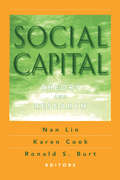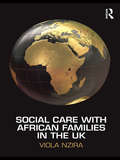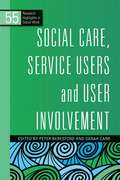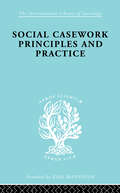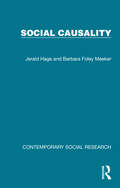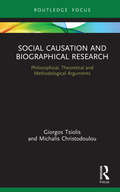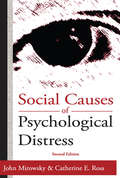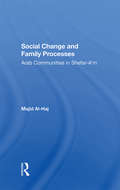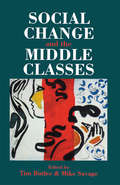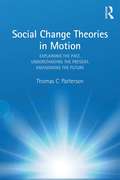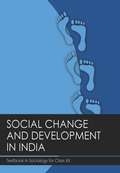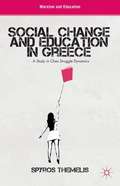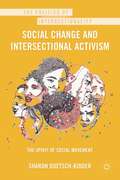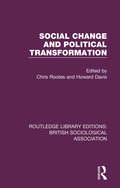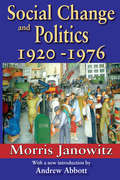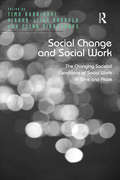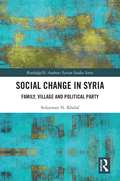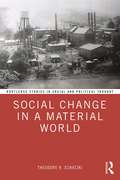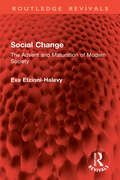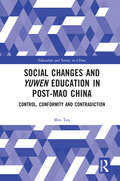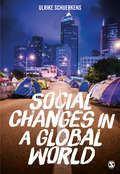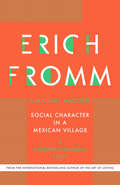- Table View
- List View
Social Capital: Theory and Research
by Rene DubosLeading scholars in the field of social networks from diverse disciplines present the first systematic and comprehensive collection of current theories and empirical research on the informal connections that individuals have for support, help, and information from other people. Expanding on concepts originally formulated by Pierre Bourdieu and James Coleman, this seminal work will find an essential place with educators and students in the fields of social networks, rational choice theory, institutions, and the socioeconomics of poverty, labor markets, social psychology, and race.The volume is divided into three parts. The first segment clarifies social capital as a concept and explores its theoretical and operational bases. Additional segments provide brief accounts that place the development of social capital in the context of the family of capital theorists, and identify some critical but controversial perspectives and statements regarding social capital in the literature. The editors then make the argument for the network perspective, why and how such a perspective can clarify controversies and advance our understanding of a whole range of instrumental and expressive outcomes.Social Capital further provides a forum for ongoing research programs initiated by social scientists working at the crossroads of formal theory and new methods. These scholars and programs share certain understandings and approaches in their analyses of social capital. They argue that social networks are the foundation of social capital. Social networks simultaneously capture individuals and social structure, thus serving as a vital conceptual link between actions and structural constraints, between micro- and macro-level analyses, and between relational and collective dynamic processes. They are further cognizant of the dual significance of the "structural" features of the social networks and the "resources" embedded in the networks as defining elements of social c
Social Care Services: The Key to the Scandinavian Welfare Model (Routledge Revivals)
by Jorma SipiläFirst published in 1997, this volume aimed to study social care services as a specific type of social policy that operates on a different set of principles as supportive services rather than as poor relief or social security work. The focus is on determining what is specifically Scandinavian about the world-famous Scandinavian welfare state, with studies on issues including the origins of four social care service models, the development of local authority social services in Iceland and social services as a gender issue.
Social Care with African Families in the UK
by Viola NziraThis important text promotes understanding of the complexities and diversities of African family life. It stimulates creative thinking about how social care professionals can develop meaningful relationships and engage confidently and effectively with African families they encounter within work contexts. The book will help students and professionals to develop specific knowledge and skills for working with African families, including refugees, asylum seekers, new and settled immigrants and people of dual heritage. Whilst highlighting differences in terms of practices across the continent, the common threads and shared identities of these families can provide the building blocks for new and relevant knowledge which then inform anti-oppressive practice. Issues such as child discipline, officialdom, roles and responsibilities within the family, image and identity and the perception of others are discussed in chapters covering: • economic and social pressures • family structures • marriage patterns/partnerships • mortality and death • faith and spirituality Containing numerous illustrative examples, this accessible text will be useful to all social work and social care students.
Social Care, Service Users and User Involvement
by Edited by Peter Beresford Sarah CarrSocial Care, Service Users and User Involvement provides a definitive introduction to practical, philosophical and theoretical issues at the heart of user involvement. This book provides an accessible account of the latest research findings regarding user involvement on three levels: the delivery and provision of services, practice and practitioners, and research and evaluation. It explores a wide range of service user needs and concerns, including the latest developments in personalisation and the effect of the Equality Act 2010. First-hand accounts illustrate the range of issues and service user needs which could be addressed by increased involvement within and beyond the social care system. The book also distinguishes between user views and user involvement, and addresses their processes outcomes and impact, as well as their measurement. This book will be a key source of information for care workers, service managers, policy makers, researchers, service users and social and health care professionals involved in social care and support service planning.
Social Casework Ils 189 (International Library of Sociology)
by Noel TimmsFirst published in 1998. Routledge is an imprint of Taylor & Francis, an informa company.
Social Causality (Contemporary Social Research)
by Jerald Hage Barbara Foley MeekerOriginally published in 1988, Social Causality takes the reader through the theoretical and practical maze that has to be negotiated before definitive statements about cause and effect in social research can be made. It was designed for the undergraduate student on a first research methods course; graduate students on more advanced methods courses will also find that it addresses questions with which they are regularly confronted.The authors explore the use of the term ‘causality’ as it exists in the social methodology, social theory and philosophical literatures, explaining different usages and common misconceptions. They argue that the construction of valuable statements about causality often requires the location and exploration of complex networks of variables, and they outline techniques for doing this. They link their views to specific studies in social psychology and organizational theory – in particular, studies of innovation and change. This strategy reflects a conviction that is evident throughout the book – that the analysis and advice of social scientists can be of practical import, and demonstrably effective.
Social Causation and Biographical Research: Philosophical, Theoretical and Methodological Arguments (Routledge Advances in Research Methods)
by Giorgos Tsiolis Michalis ChristodoulouThis book extends debates in the field of biographical research, arguing that causal explanations are not at odds with biographical research and that biographical research is in fact a valuable tool for explaining why things in social and personal lives are one way and not another. Bringing reconstructive biographical research into dialogue with critical realism, it explains how and why relational social ontology can become a unique theoretical ground for tapping emergent mechanisms and latent meaning structures. Through an account of the reasons for which reductionist epistemologies, rational action models and covering law explanations are not appropriate for biographical research, the authors develop the philosophical idea of singular causation as a means by which biographical researchers are able to forge causal hypotheses for the occurrence of events and offer guidance on the application of this methodological principle to concrete, empirical examples. As such, this volume will appeal to scholars across the social sciences with interests in biographical research and social research methods.
Social Causes of Psychological Distress (Social Institutions And Social Change Ser.)
by Catherine E. RossA core interest of social science is the study of stratification--inequalities in income, power, and prestige. Few persons would care about such inequalities if the poor, powerless, and despised were as happy and fulfilled as the wealthy, powerful, and admired. Social research often springs from humanistic empathy and concern as much as from scholarly and scientific curiosity. An economist might observe that black Americans are disproportionately poor, and investigate racial differences in education, employment, and occupation that account for disproportionate poverty. A table comparing additional income blacks and whites can expect for each additional year of education is thus as interesting in its own right as any dinosaur bone or photo of Saturn. However, something more than curiosity underscores our interest in the table. Racial differences in status and income are a problem in the human sense. Inequality in misery makes social and economic inequality personally meaningful. There are two ways social scientists avoid advocacy in addressing issues of social stratification. The first way is to resist projecting personal beliefs, values, and responses as much as possible, while recognizing that the attempt is never fully successful. The second way is by giving the values of the subjects an expression in the research design. Typically, this takes the form of opinion or attitude surveys. Researchers ask respondents to rate the seriousness of crimes, the appropriateness of a punishment for a crime, the prestige of occupations, the fair pay for a job, or the largest amount of money a family can earn and not be poor, and so on. The aggregate judgments, and variations in judgments, represent the values of the subjects and not those of the researcher. They are objective facts with causes and consequences of interest in their own right. This work is an effort to move methodology closer to human concerns without sacrificing the scientific grounds of research as such. The
Social Change And Family Processes: Arab Communities In Shefar-a'm
by Majid Al-hajIn this book, Majid Al-Haj analyzes the structure of family kinship groups, the role of women, and fertility among several Arab subcommunities in Israel. He combines historical materials, anthropological evidence, and several major surveys in tracing family and demographic patterns in a developing Arab community. This study is the first to compare Moslems, Christians, and Druze over time in the same community and to integrate issues of modernization and population for minorities. Particular attention is given to the analysis of "internal refugees" among Moslems, the separation of structural from cultural determinants of family patterns, and the distinction between behavior and norms associated with family lifestyles. This volume represents a fascinating case study of an Arab town in the transition to modernity under the conditions of changing layers of minority status in Israeli society. Moreover, the author addresses broader issues of modernization and demographic change characterizing the Middle East and other developing areas of the world where minority ethnic conflict and population processes are intertwined.
Social Change And The Middle Classes
by Mike SavageFirst Published in 1995. The study of the middle classes actually poses a variety of interesting challenges. Traditionally, the social scientific gaze has been directed either downwards, to the working classes, the poor and the dispossessed, or upwards, to the wealthy and powerful. For all these reasons, a collection of original papers on various aspects of the British middle classes seems an important venture that will cast valuable light on the course of social change in Britain more generally. This book is designed to bring together a series of accessible, high-quality research papers on various aspects of the British middle classes.
Social Change Theories in Motion: Explaining the Past, Understanding the Present, Envisioning the Future
by Thomas C. PattersonThis book assesses how theorists explained processes of change set in motion by the rise of capitalism. It situates them in the milieu in which they wrote. They were never neutral observers standing outside the conditions they were trying to explain. Their arguments were responses to those circumstances and to the views of others commentators, living and dead. Some repeated earlier views; others built on those perspectives; a few changed the way we think. While surveying earlier writers, the author’s primary concerns are theorists who sought to explain industrialization, imperialism, and the consolidation of nation-states after 1840. Marx, Durkheim, and Weber still shape our understandings of the past, present, and future. Patterson focuses on explanations of the unsettled conditions that crystallized in the 1910s and still persist: the rise of socialist states, anti-colonial movements, prolonged economic crises, and almost continuous war. After 1945, theorists in capitalist countries, influenced by Cold War politics, saw social change in terms of economic growth, progress, and modernization; their contemporaries elsewhere wrote about underdevelopment, dependency, or uneven development. In the 1980s, theorists of postmodernity, neoliberalism, globalization, innovations in communications technologies, and post-socialism argued that they rendered earlier accounts insufficient. Others saw them as manifestations of a new imperialism, capitalist accumulation on a global scale, environmental crises, and nationalist populism.
Social Change and Development in India (Sociology) class 12 - Meghalaya Board
by Meghalaya Board of School EducationThis Social Change and Development in India Textbook will be an ideal book for the students of class 12 to learn sociology. The book maintains strict parity with the syllabus and the guidelines laid out by the CBSE. The enriched content will not only help the students to score good marks in their board examination but will also help them learn the basics of Sociology.
Social Change and Development in India class 12 - NCERT - 23 (Sociology)
by National Council Of Educational Research And TrainingThe "Social Change and Development in India" textbook for class 12 covers various aspects of social change in India. It explores theories of social change, the impact of colonialism, rural and agrarian transformation, industrialization and urbanization, social movements, globalization, gender issues, education and health, and sustainable development. The book provides an understanding of the dynamics, factors, and implications of social change in the Indian context. It aims to equip students with knowledge about the societal changes that have occurred, their causes, and their effects on development.
Social Change and Education in Greece
by Spyros ThemelisAims to inform students, scholars, and educators about the complex processes and factors that promote or impede education's potential to enhance individual advancement within the socioeconomic structure of a late-industrialized country within the context of modern capitalism.
Social Change and Intersectional Activism
by Sharon Doetsch-KidderReading texts in relation to feminist, queer, and race theory and Buddhist philosophy, this book argues that an understanding of spirit is critical to explaining the power that social movements have to change hearts, minds, and social structures.
Social Change and Political Transformation: A New Europe? (Routledge Library Editions: British Sociological Association #5)
by Howard Davis Chris RootesSocial Change in Political Transformation is thorough examination of political transformation the book features contributors from western and eastern Europe, giving their views on how European society and institutions are changing. The themes of social change, new movements and the development of European institutions are developed within a broad framework, and are supposed by considerable empirical detail relating to the European Community and a disaggregated eastern Europe. Students of political sociology, politics and European studies will all find this a useful text providing theories and explanations, as well as summaries of recent research.
Social Change and Politics: 1920-1976
by Morris JanowitzThis classic study deals with social control in advanced industrial society, especially the United States, and particularly the half-century after World War I. The United States is representative of Western advanced industrial nations that have been faced with marked strain in their political institutions. These nation-states have been experiencing a decline in popular confidence and distrust of the political process, an absence of decisive legislative majorities, and an increased inability to govern effectively, that is, to balance and to contain competing interest group demands and resolve political conflicts.Janowitz uses the sociological idea of social control to explore the sources of these political dilemmas. Social control does not imply coercion or the repression of the individual by societal institutions. Social control is, rather, the face of coercive control. It refers to the capacity of a social group, including a whole society, to regulate itself. Self-regulation implies a set of higher moral principles beyond those of self-interest.Since the end of World War II, the expanded scope of empirical research has profoundly transformed the sociological discipline. The repeated efforts to achieve a theoretical reformulation have left a positive residue, but there have been no new conceptual breakthroughs that are compelling. This book is a concerted and detailed effort organize and to make sense out of the vastly increased body of empirical research.
Social Change and Social Work: The Changing Societal Conditions of Social Work in Time and Place
by Timo Harrikari Pirkko-Liisa RauhalaSocial Change and Social Work discusses and examines how social work is challenged by social, political and economic tendencies going on in current societies. The authors ask how social work as a discipline and practice is encountering global and local transformations. Divided into three parts, topics covered include the changing social work mandate throughout history; social work paradigms and theoretical considerations; phenomenological social work; practice research; and gender and generational research. Taken together, the chapters in this anthology provide an authoritative and up-to-date overview of current discussions within the European social work research community.
Social Change in Syria: Family, Village and Political Party (Routledge/ St. Andrews Syrian Studies Series)
by Sulayman N. KhalafStudying a rural village in northern Syria during a period of tremendous social and political change (1940s to 1970s), this book offers a unique perspective on how agrarian transformations in land distribution and its use deeply affected social and political relations among a rural community. Embedding the personal with the local and the global, this work traces the seeds of social, political and economic struggles that are still important and unfolding in Syria forty years on: changes in social relations brought about by land policy and technological modernization, divisions and connections between urban and rural locations, shifts in education and immigration. Thematically, the study is divided into two parts: the first concerns the historical, socio-economic and political changes occurring in Syria from the beginning of the twentieth century, and the second concerns the life histories of particular actors and their perspectives on social changes. This book is the edited and updated version of Khalaf’s original work, including an ‘updating chapter’ which brings invaluable insight about the village and its people at the aftermath of ISIS and the destruction of the war in Syria. Focusing on the village community of Hawi Al-Hawa, this intensely knowledgeable and personal account — a rare combination — brings village life in Syria strikingly close. The volume is an important contribution to the fields of anthropology, social sciences, Syrian and Middle East studies.
Social Change in a Material World: How Activity and Material Processes Dynamize Practices (Routledge Studies in Social and Political Thought)
by Theodore R. SchatzkiSocial Change in a Material World offers a new, practice theoretical account of social change and its explanation. Extending the author’s earlier account of social life, and drawing on general ideas about events, processes, and change, the book conceptualizes social changes as configurations of significant differences in bundles of practices and material arrangements. Illustrated with examples from the history of bourbon distillation and the formation and evolution of digitally-mediated associations in contemporary life, the book argues that chains of activity combine with material events and processes to cause social changes. The book thereby stresses the significance of the material dimension of society for the constitution, determination, and explanation of social phenomena, as well as the types of space needed to understand them. The book also challenges the explanatory significance of such key phenomena as power, dependence, relations, mechanisms, and individual behavior. As such, it will appeal to sociologists, geographers, organization studies scholars, and others interested in social life and social change.
Social Change: The Advent and Maturation of Modern Society (Routledge Revivals)
by Eva Etzioni-HalevyFirst published in 1981, Social Change offers a critical review of the main classical and modern theories of social change, and a study of the processes of change in western societies since modernization. It focusses on the cardinal aspects of society, and those that have figured most prominently in various theories: the economy, the class structure, the political structure, and the structure of education, as they changed throughout the process of modernization and up to the 1980s.The book is divided into three parts. Part I presents a general discussion of classical and contemporary theories of the advent and maturation of modern society in Western capitalist and non-Western countries. Part II provides a more detailed discussion of modernization and subsequent changes in the Western, capitalist societies. Part III examines alternative social formations—communes and co-operatives. This book will be a beneficial read for students and researchers of sociology.
Social Changes and Yuwen Education in Post-Mao China: Control, Conformity and Contradiction (Education and Society in China)
by Min TaoInspired by the author’s observations of the language curriculum as a practising teacher for the past 20 years, this book addresses how the high school Chinese language and literacy (Yuwen) curriculum in China was controlled and directed in the post-Mao era. Examining the social and political domination from 1980 to 2010, the book offers insights into how teachers and schools responded to the top-down curriculum change in their teaching practice. This book discusses some of the most important questions concerning China and its education system: What changes have occurred in the Chinese language and literacy curricula; how and why the changes have occurred; who has been in control of the process and outcome; and what impacts the curriculum changes may bring not only to China but to the international sectors that "export" education and degrees to China and Chinese students. The author provides answers to these questions crucial to both the contemporary Chinese society and the students who come out of that system. This critical inquiry of the Yuwen curriculum and its implementation provides a valuable and timely showcase for understanding the ideology of China's future generation and the social and political transformation in the past three decades. In addition to researchers, this book is expected to have impact on policymakers in China and beyond, where Chinese migrants and international students constitute a substantial learning population.
Social Changes in a Global World
by Ulrike SchuerkensRenowned author Ulrike Schuerkens presents an in-depth exploration of social transformations and developments. Combining an international approach with up-to-date research, the book: Has dedicated chapters on contemporary topics including technology, new media, war and terror, political culture and inequality Includes an analysis of societal structures – inequality, globalization, transnationalism Contains learning features including: discussion questions, annotated further reading, chapter summaries and pointers to online resources to assist with study A must buy for students taking modules in social change, social inequality, social theory and globalization.
Social Changes in a Global World
by Ulrike SchuerkensRenowned author Ulrike Schuerkens presents an in-depth exploration of social transformations and developments. Combining an international approach with up-to-date research, the book: Has dedicated chapters on contemporary topics including technology, new media, war and terror, political culture and inequality Includes an analysis of societal structures – inequality, globalization, transnationalism Contains learning features including: discussion questions, annotated further reading, chapter summaries and pointers to online resources to assist with study A must buy for students taking modules in social change, social inequality, social theory and globalization.
Social Character in a Mexican Village
by Erich Fromm Michael MaccobyThe renowned psychoanalyst Erich Fromm not only analyzed society and societal processes. Together with Michael Maccoby he did a study of Mexican peasants to empirically illustrate how historical, economic and social requirements determine behavior. Social Character in a Mexican Village does much more than introduce a new approach to the analysis of social phenomena. It throws new light on one of the world's most pressing problems, the impact of the industrialized world on the traditional character of peasants. Unanimously the book is an outstanding introduction to Fromm's concept of social character.
